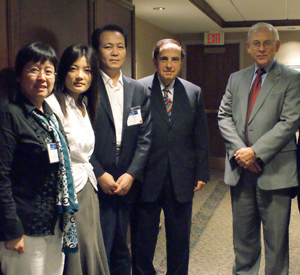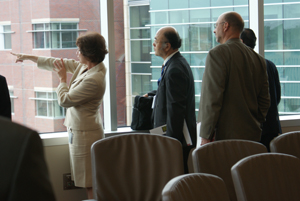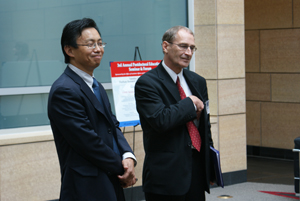 |
UNMC Chancellor Harold M. Maurer, M.D., second from right, and UNMC Vice Chancellor for Business and Finance Don Leuenberger, right, with the Chinese delegation that visited UNMC on Thursday. |
 |
UNMC Director of Research Resources Paula Turpen, Ph.D., left, shows visitors from the Reverse Trade Mission the view of the medical center campus from the eighth floor of the Durham Research Center. |
 |
Jialin Zheng, M.D., left, director of the UNMC Asia Pacific Rim Development Program, and Darrell Ullman of the Nebraska Department of Economic Development, address the international visitors during their visit to the Durham Research Center on Thursday. |
“We had people who would pick us up each morning at 8:30 a.m., then drop us back at our hotel at 9 p.m.” he said. “They were with us the entire day and really took care of us. They couldn’t have been nicer or more hospitable.”
Now, it’s payback time.
On Thursday, a contingent of Chinese and Japanese professionals came to UNMC as part of the first-ever reverse trade mission under the direction of Nebraska Gov. Dave Heineman.
They heard an overview of UNMC’s research efforts by James Linder, M.D., associate vice chancellor for research and president and CEO of UNeMed, UNMC’s technology transfer organization, as well as presentations from several UNMC researchers.
In all, more than 100 professionals from Brazil, Canada, China, Costa Rica, Hong Kong, Japan and South Korea are in Nebraska for the reverse trade mission, which started Wednesday and runs through Saturday.
During their stay in Nebraska, the foreign visitors will take tours highlighting Nebraska industries such as research, information technology, agriculture, renewable energy, distribution and logistics. UNMC was one of the tour stops. Other stops include a Cargill ethanol plant, Union Pacific Railroad and the Kawasaki plant in Lincoln.
Two of the visitors to UNMC — both from the Chinese Academy of Sciences in Beijing — have special significance to Dr. Maurer, as they were instrumental in making sure that his visit to China went off without a hitch. They are Le Kang, Ph.D., president of the Beijing Institutes of Life Science, and Yong Zhao, M.D., Ph.D., a professor of transplantation biology research in the Institute of Zoology. They are planning to spend several days in Omaha.
“I want to make sure these two gentlemen enjoy their stay in Omaha,” he said. “Now, it’s my turn to take care of them.”
|
During his trip to China, Dr. Maurer signed an agreement with the Chinese Academy of Sciences — the Chinese equivalent of the U.S National Academy of Science — to form a joint center for research collaboration. Other U.S. institutions including the University of California-Davis, University of Arizona and Rutgers University already have expressed interest in joining this center.
In addition, Dr. Maurer also signed an agreement with Shanghai Jiao Tong University School of Medicine to initiate a joint M.D./Ph.D. program that would allow medical students from the Chinese university to come to UNMC to earn a Ph.D. degree after their M.D. training in China. It’s the first such program between a U.S. and Chinese university.
“What many of the universities do — with some exceptions — is they go over there (to China), and they sign agreements and nothing really happens,” Dr. Maurer said. “The agreements are shelved. That’s not what we’re doing. If we sign agreements with Beijing and Shanghai in these areas, we contribute and they contribute. We’ve also been very fortunate that we are on the list of institutions in which their students will be eligible for scholarship support. There are about 10 such institutions in the United States. We now have made that list.”
Dr. Maurer said UNMC initially plans to focus most of its attention internationally on China and India.
He noted that a group of UNMC officials will be going to China next month to continue to build relationships.